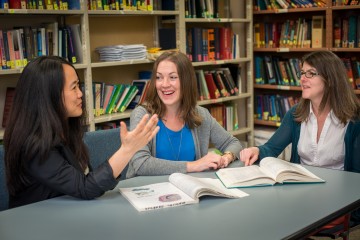Pictured: Serena Talcott Baughman (centre) with Tracey Oh (left) and Jenna Scott (right), Genetic Counselling Co-Directors.
By virtue of the year she graduated and her place in the alphabetical order of graduates, Serena Talcott Baughman is a walking milestone for the Department of Medical genetics’ 18-year-old Genetic Counselling program.
A “Top Ten” Career
Serena’s path to genetic counselling began with a summer stint at the Oregon National Primate Research Centre in 2009. Science had been her job for the past decade – as a teacher of basic biology to Portland ninth-graders. But the lab work, while socially isolating, was intellectually stimulating, and she wanted to find a way of combining the excitement of science with the personal interactions that are a natural part of teaching.
Her supervising researcher suggested genetic counselling. It was a new term to her, as it still is to most people. But she quickly discovered that it had been listed as one of the “Top Ten New Careers” by U.S. News and World Report.
Serena soon discovered what this new profession was all about: helping people understand the implications of a diagnosis or test results of genetic disorders. In some cases, counsellors advise parents – those with genetic conditions who are considering having children, or are expecting a child at risk of having an inherited condition, or have a child born with an inherited condition. In other cases, counsellors help adults make sense of their own diagnoses or test results. Sometimes, a genetic counsellor winds up working with an extended family whose members might share a genetic trait.
“As a teacher, genetics was always the subject we spent more time on, because of the ethical questions, the family stories, the relevance to the kids’ personal lives,” she said. “It was my favourite part of the school year, and I think it was the kids’ favourite part, too. I just didn’t know that anything existed that so perfectly blended human genetics and the opportunity to hear people’s stories and facilitate decisions.”
Two Job Offers Before Graduation
Serena soon found herself taking science courses at Portland State University and Portland Community College, shadowing genetic counsellors, and volunteering as a crisis counsellor – all pre-requisites for being admitted to a genetic counselling program.
UBC’s two-year master’s program was the closest one to Portland. From a group of about 100 applicants, Baughman was one of the six students admitted each year. (The program is funded entirely by tuition, so it admits students regardless of where they live.)
Based at BC Women’s Hospital and Health Centre, UBC’s program is one of only four in Canada, and the largest. It was championed by Jan Friedman and Dessa Sadovnick, Professors in the Department of Medical Genetics, and was led for its first years by Anita Dircks, a Clinical Assistant Professor. It’s now led by two co-directors, Clinical Instructor Tracey Oh and Clinical Assistant Professor Jenna Scott.
Considering the rapid advances in genetics during the past two decades (the human genome’s rough draft wasn’t announced until 2000, four years after the program’s creation), the curriculum has been in a constant state of evolution. Students are now prepared for the possibility of genetic counselling specialities – in cancer, for example – that didn’t exist when the program was first created.
“Our graduates are still ready to do any job,” Oh says. “We give them the tools to adapt, because genetics is changing all the time.”
Serena is a testament to that preparation – the week before graduation, she received two job offers in Portland. She and her family are heading back there, where she will become a counsellor at a fertility clinic, advising patients about pre-implantation genetic screening and diagnosis, the implications of having children at an advanced age, genetic screening results and family histories, and genetic causes of infertility. She will also help screen sperm and egg donors.
“I’ll be working in a small medical practice with a close-knit team of doctors and staff with a common goal,” Serena says. “I was also drawn by the opportunity to help a diverse patient population, many of whom travel to this clinic from all over the world seeking help in starting a family.”
